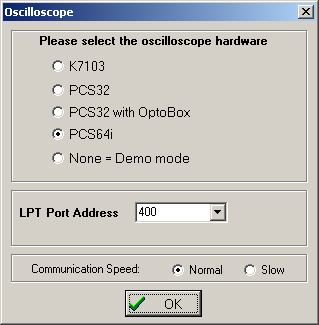Hi,
I have got a pcs64i, recently i bought a new laptop without parallel port.
can i buy a PCMCIA / PARALLEL card? it will works?
Do you have any solution to use this osciloscope without a parallel port.
Tank you
Luca
Hi,
I have got a pcs64i, recently i bought a new laptop without parallel port.
can i buy a PCMCIA / PARALLEL card? it will works?
Do you have any solution to use this osciloscope without a parallel port.
Tank you
Luca
I have just purchased the Quatech pcmcia parallel card, the WinDSO software will only talk the standard port adress ie 0378 or 0278 or 03BC, the parallel port card gets assigned an address much higher than that. mine was assigned FDF8, the lowest address I could get the laptop to assign was 0400, which WinDSO wont talk too…
I was hoping somebody here might know how to reassign the address to which WinDSO talks???
Jay
I’ll send you a modified program, you can type any LPT port address.
Select Options/Hardware setup menu option and enter LPT port address.

Thank you the program works with the quatech.
it seem that I now have an 18ms repeating pulse. amplitude does not change with input setting.
I need to get to one of my machines and check this out to see if it is going to be a problem.
VEL255,
Please can you send to me the same program?
I bought a PCMCIA / Parallel card whit the same problem of address.
Thank you
Luca
You may download the software from:
vel255.diinoweb.com/files/WinDSO_FG32.zip
Tank you VEL255, with your program i can use my PCS64i again!
My pc card bus Sunix work on LPT2 ( port 2 in the connector ) with address FDE8.
I hope this help.
Best Regards
Luca
I have a PCI parallel adpater from startech PCI2S1P and was hoping if someone could tell me where i find the parallel port address - there is a tab in the device properties that has i/o raneg and irq.
thanks
mark
The address is the first hexadecimal value of the I/O range.
See also these threads for the solution:
thanks for your help. what this means is that i can use my pcs64i scope with windows vista using a parallel port on a PCI card.
[quote=“VEL255”]I’ll send you a modified program, you can type any LPT port address.
Select Options/Hardware setup menu option and enter LPT port address.
 [/quote]
[/quote]
Could you send me this program? I am having the same problem with my PSC64i
You may download the software from:
vel255.diinoweb.com/files/WinDSO_FG32.zip
I have a pclab2000 and a pcs64i. The former is a magnificent instrument and I especially appreciate its portability. However, for safety reasons I often prefer the pcs64i when working at my desk, since it is optically isolated from the computer. Unfortunately, I now have a computer without a parallel port . The pcmia parallel adapters have LPT addresses which do not correspond to the three addrwsses in the standard program for this model. I read in the Forum that there is a modified program which allows one to type in any LPT address. Coould you tell me how to get this program?
Here is the link to download the updated software: app.box.com/shared/ny0kk9bpkq
I downloaded the file from the link you gave, but it didn’t install a program. Since it instructed me to extract all files I then tried extracting them to th folder in which the original program was stored, instructing it to overwrite existing files. I then had what appeared to be the modified program. However, when I typed in the LPT address of my adapter i still got the message “no hardware response”. I don’t know whether the adapter used could be the cause . It is M-CAB 7100087 and has LPT number FFE8 on my computer.
Yes, the software package is ready to use just after extracting the ZIP package to a folder.
In this thread there is an example with screenshots how to check the IO address of the card:
viewtopic.php?f=10&t=2154
If the address and everything is OK but no response, there may be indeed a compatibility problem with the adapter and it can’t be used in this case.
BTW: The PCS64i doesn’t work on 64-bit operating systems.
Thank you very much for your speedy and enlightening replies. you are of course right: one has to choose the right adapter.
My basic problem, however, was that the pclab 1000 scope is not isolated from the computer. I have now found a solution of this problem, which I state here for the possible benefit of others. I placed a DeLock adapter 62487 between the scope and the USB port. This is a USB to USB adapter with a built in optocoupler. According to the manufacturer it provides 5kV protection to the host device, is USB 1.1 compliant, and supports USB 2.0 in full speed and low speed modes. I can see no difference in the performance of the scope when used with this device.